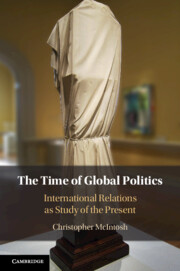Book contents
- The Time of Global Politics
- The Time of Global Politics
- Copyright page
- Contents
- Acknowledgments
- 1 Theorizing with the Present
- 2 The Temporal Imaginary of International Relations
- 3 A Presentist Approach to International Relations
- 4 The Temporality of IR Theories
- 5 The Time of War
- 6 Making America Great Again, Again, and Again
- 7 Beyond Disciplinary Prediction
- 8 Theorizing Responsibly
- Conclusion
- References
- Index
7 - Beyond Disciplinary Prediction
Alternative Futures
Published online by Cambridge University Press: 23 November 2023
- The Time of Global Politics
- The Time of Global Politics
- Copyright page
- Contents
- Acknowledgments
- 1 Theorizing with the Present
- 2 The Temporal Imaginary of International Relations
- 3 A Presentist Approach to International Relations
- 4 The Temporality of IR Theories
- 5 The Time of War
- 6 Making America Great Again, Again, and Again
- 7 Beyond Disciplinary Prediction
- 8 Theorizing Responsibly
- Conclusion
- References
- Index
Summary
This chapter draws out implications for a defining element of a positivist approach – prediction. Prediction is the primary way positivist scholarship engages the future as well as one of the elements of analysis that define it as “scientific” rather than historical or critical. Presentism demonstrates that while those who do not study history may be doomed to repeat it, those who do study the past are not guaranteed to predict it. The chapter lays out how the presentist move implicates what I call “Disciplinary Prediction,” the predominant way that IR approaches and imagines the future. This chapter evaluates what happens if we divorce the concept of prediction from temporal assumptions that presume continuity and regularity. Once prediction’s temporal scope is allowed to be more limited, contingent, and indeterminate, projects that de-emphasize linearity, actively theorize temporal recurrences, incorporate cycles, and allow for contingency, emergence, and flexibility become increasingly viable. Predictions based on critically informed scholarship also become much more imaginable, enabling a better theorization of the politics of critique as action.
Keywords
Information
- Type
- Chapter
- Information
- The Time of Global PoliticsInternational Relations as Study of the Present, pp. 198 - 233Publisher: Cambridge University PressPrint publication year: 2023
